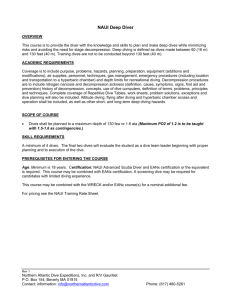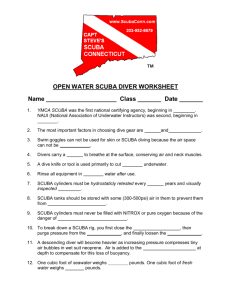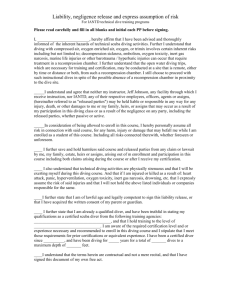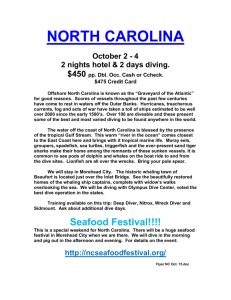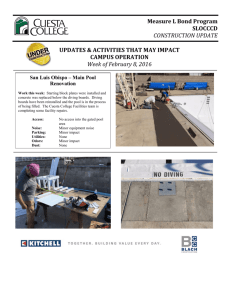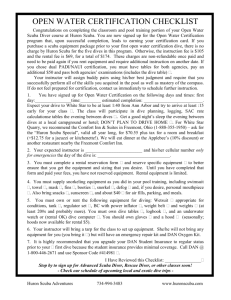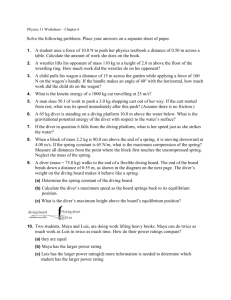USEA105_Syllabus_20151020
advertisement
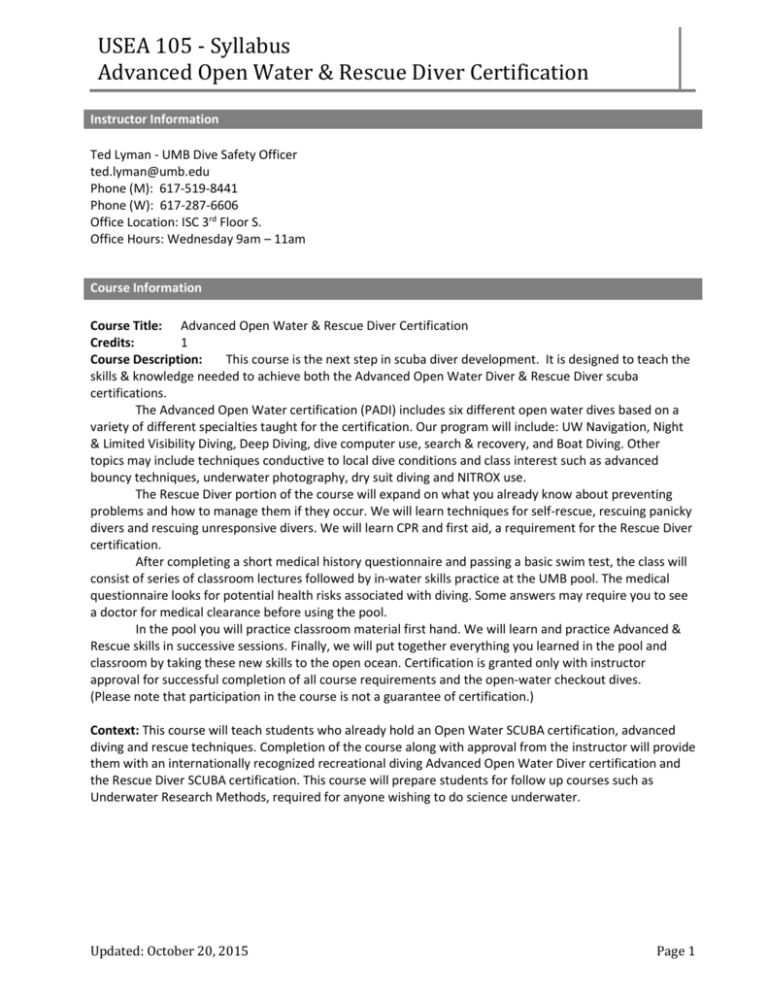
USEA 105 - Syllabus Advanced Open Water & Rescue Diver Certification Instructor Information Ted Lyman - UMB Dive Safety Officer ted.lyman@umb.edu Phone (M): 617-519-8441 Phone (W): 617-287-6606 Office Location: ISC 3rd Floor S. Office Hours: Wednesday 9am – 11am Course Information Course Title: Advanced Open Water & Rescue Diver Certification Credits: 1 Course Description: This course is the next step in scuba diver development. It is designed to teach the skills & knowledge needed to achieve both the Advanced Open Water Diver & Rescue Diver scuba certifications. The Advanced Open Water certification (PADI) includes six different open water dives based on a variety of different specialties taught for the certification. Our program will include: UW Navigation, Night & Limited Visibility Diving, Deep Diving, dive computer use, search & recovery, and Boat Diving. Other topics may include techniques conductive to local dive conditions and class interest such as advanced bouncy techniques, underwater photography, dry suit diving and NITROX use. The Rescue Diver portion of the course will expand on what you already know about preventing problems and how to manage them if they occur. We will learn techniques for self-rescue, rescuing panicky divers and rescuing unresponsive divers. We will learn CPR and first aid, a requirement for the Rescue Diver certification. After completing a short medical history questionnaire and passing a basic swim test, the class will consist of series of classroom lectures followed by in-water skills practice at the UMB pool. The medical questionnaire looks for potential health risks associated with diving. Some answers may require you to see a doctor for medical clearance before using the pool. In the pool you will practice classroom material first hand. We will learn and practice Advanced & Rescue skills in successive sessions. Finally, we will put together everything you learned in the pool and classroom by taking these new skills to the open ocean. Certification is granted only with instructor approval for successful completion of all course requirements and the open-water checkout dives. (Please note that participation in the course is not a guarantee of certification.) Context: This course will teach students who already hold an Open Water SCUBA certification, advanced diving and rescue techniques. Completion of the course along with approval from the instructor will provide them with an internationally recognized recreational diving Advanced Open Water Diver certification and the Rescue Diver SCUBA certification. This course will prepare students for follow up courses such as Underwater Research Methods, required for anyone wishing to do science underwater. Updated: October 20, 2015 Page 1 USEA 105 - Syllabus Advanced Open Water & Rescue Diver Certification Prerequisites: Each student must show proof of the following at or by the beginning of the course: (Forms with instructions will be available before the class begins) 1. UMB Liability Waiver 2. DAN “Master” Insurance (or greater - you can find out more info here: www.diversalertnetwork.org) 3. UMB Medical History Questionnaire 4. Students must already hold a Basic Open Water SCUBA certification from a recognized certification agency. (PADI, NAUI, SSI, SDI etc.) a. Students must bring a copy of their certification card(s) (both front and back) to the first class for inclusion in their student records folder. b. Students must bring their SCUBA log books for review of recent diving activity. The first class session will consist of the completion and review of a medical history questionnaire. Students must not have any medical contraindications* prior to participation in SCUBA activities in order to continue in the course. (*Existing medical conditions such as actively treated asthma or certain heart conditions are unfortunately aggravated by scuba diving. Please talk to the instructor directly if you have any concerns.) Prerequisite Skills: The first lab will consist of a water skills evaluation. Students must successfully complete the water skills evaluation in order to continue in the course. The water skills evaluation consists of the following: 1. Swim-test a. Potential students must demonstrate that they are comfortable in water by passing a swimming/watermanship test acceptable to the instructor, including but not limited to: i. Swim 400 meters/yards ii. Tread/float in water to deep to stand in for 12 minutes iii. Swim 25 meters/yards underwater on one breath iv. Towing another diver 25 meters/yards Course Objectives: Upon successful completion of course requirements you will: 1. Have a high proficiency in Advanced & Rescue Diver SCUBA skills. a. Upon completion of this course the student will be able to perform the following skills. i. Plan and execute advanced level dives without instructor supervision in the following areas: deep diving, underwater navigation, and night/limited visibility diving along with 2 other specialties TBD by end of class. ii. Demonstrate techniques for self-rescue, rescuing panicky divers and rescuing unresponsive divers. iii. You will learn CPR and basic first aid 2. Improve your knowledge of the equipment, science and technology applicable to advanced SCUBA diving in New England waters 3. Understand advanced dive physics, physiology, environments, decompression theory and dive planning. 4. Be able to prepare and plan for diving emergencies Updated: October 20, 2015 Page 2 USEA 105 - Syllabus Advanced Open Water & Rescue Diver Certification 5. Upon instructor approval, you will be awarded both the Advanced & Rescue Diver SCUBA certifications from an internationally recognized certification agency Course Goals: The goals for students enrolled for this course focus on the following: 1. Understanding all aspects of becoming an Advanced certified SCUBA diver through class participation using the assigned readings from the textbook and handouts. 2. Successfully complete and pass written exams and quizzes given. 3. Successfully complete all confined water skills by actively participating in activities at every pool session. 4. Become a more confident & competent diver. Required Assignments: Weekly Quizzes: Students will take short quizzes based on weekly assignments Dive Log/Class Note book: Students are expected to keep a class notebook with a dive log during the class. All diving, both from pool and the open water must be logged after each dive. The notebook/dive log will be collected at the end of the course for review and grading Diving Emergency Presentation: Students will be asked to give a 3 to 5 minute presentation of a case study on a diving emergency scenario. The emergency scenario will be assigned in class Pool Skills Evaluations: Students will be expected to demonstrate proficiency for all scuba skills learned in the pool Advanced Dive Planning & Skills Evaluations: Students will be expected to use the lessons learned in the classroom to plan & execute our 6 required Advanced Open Water dives Rescue Diving Planning & Skills Evaluations: Students will be expected to use the lessons learned in the classroom to plan & execute our two Rescue dives. In open water you will demonstrate proficiency for different rescue scenarios presented Final Exam: Students are expected to pass a final exam consisting of materials from both the classroom and the pool Course Rubric: Assignment/Deliverable Number Grade % Weekly quizzes 10 Dive Log/Notebook 5 Diving Emergency Presentation 5 Pool Skills Evaluations OW Advanced Dive Planning & Skills Evaluations OW Rescue Diving Planning & Skills Evaluations: Final Exam 20 Participation (as defined below) 10 Attendance (as defined below) 10 Updated: October 20, 2015 15 15 10 Page 3 USEA 105 - Syllabus Advanced Open Water & Rescue Diver Certification Course Policies: 1. Attendance and Participation (see University Attendance Policy later in this syllabus) This course requires active participation from all class members. Good participation is a matter of both quality and quantity. Being late to class is the equivalent of 1/2 of an absence. If you fail to attend more than 2 lectures without proper documentation of the absence you will not be allowed to complete the water-based activities and will not have your open water skills evaluated which means losing a total of 25 points towards your final grade. This is a class based on gaining practical skills and applying them in the water. We expect you to be actively engaged in the classroom and on the water in not only developing your own skills but in actively supporting the skills development of your classmates. More broadly speaking: Ask questions. Be curious. Safety is a primary focus of this course and we want to hear from you when you have a question or concern. Share your perspectives and experiences in a productive and supportive manner adds to your learning as well as the success of your classmates. Your active participation will be consequently factored into your final grade for the course. If you’re reluctant to speak up, please talk to your instructors and we’ll figure out a way for you to participate. Students are expected to (1) complete all required reading and writing assignments prior to class, (2) thoughtfully participate in class discussions & presentations, (3) take responsibility for helping create a positive learning environment by arriving promptly, (4) listening respectfully, and participating constructively, (5) provide general assistance in preparation and clean up, and entering all data and logging dives in a timely manner. Grading Grading: Grade type for the course is a whole or partial letter grade. (Please see table below) Grading Policy Letter Grade A AB+ B BC+ C F INC IF W Percentage 93-100% 90-92% 87-89% 83-86% 80-82% 77-79% 73-76% 0-72% A grade of Incomplete (INC) is not automatically awarded when a student fails to complete a course. Incompletes are given at the discretion of the instructor. They are awarded when satisfactory work has been accomplished in the majority of the course work, but the student is unable to complete course requirements as a result of circumstances beyond his/her control. The student must negotiate with and receive the approval of the course instructor in order to receive a grade of incomplete Received for failure to comply with contracted completion terms. Received if withdrawal occurs before the withdrawal deadline. Updated: October 20, 2015 Quality Points 4.00 3.75 3.25 3.00 2.75 2.25 2.00 0.0 N/A N/A N/A Page 4 USEA 105 - Syllabus Advanced Open Water & Rescue Diver Certification AU NA Audit (only permitted on space-available basis) Not Attending (student appeared on roster, but never attended class. Student is still responsible for tuition and fee charges unless withdrawal form is submitted before deadline. NA has no effect on cumulative GPA.) N/A N/A Required Text(s): Advanced Open Water SCUBA Instruction Manual (TBD) Rescue Diver Instruction Manual (TBD) UMass Boston Diving Manual (pdf) Lab Notebook Technical Requirements: Mask & snorkel (required) For our open water checkout dives, you will need to rent or borrow SCUBA equipment Rental information and a discount will be provided for students who do not have their own gear. If you do have access to SCUBA gear you will need the following: Full cold water SCUBA diving gear including: cold water immersion protection (wet suit (7mm) or dry suit – with hood, gloves, boots), buoyancy compensator (BC), regulator with backup (octopus reg.), gauges (depth, tank pressure), dive computer, compass, full foot fins. Updated: October 20, 2015 Page 5 USEA 105 - Syllabus Advanced Open Water & Rescue Diver Certification Course Schedule Classes will be Wednesday evenings from 6 to 10pm throughout the semester Day January 27 February 3 February 10 February 17 February 24 March 2 March 9 March 23 March 30 April 6 April 13 April 16 & 17 April 23 & 24 Topic Readings Lecture: Introduction, Basic skills & equipment refresher TBD Pool: Skills Evaluation, Equipment refresher Lecture: Better Buoyancy TBD Pool: Advanced Buoyancy & Propulsion Techniques Lecture: Advanced Decompression Theory, Dive Computers & Deep Diving TBD Pool: Dive Computers & Deep Diving skills Lecture: Navigation, Mapping and Search & Recovery TBD Pool: Navigation, Mapping and Search & Recovery skills Lecture: Boat Diving, Night & Limited Visibility/ TBD Pool: Boat Diving, Night & Limited Visibility skills Lecture: Underwater Photography, UW Naturalist & Science Diving introduction TBD Pool: UW Photography, & Science Diving basics Lecture: Advanced Dive Safety & Task Loading TBD Pool: Advanced Dive Safety & Task Loading skills Lecture: Rescue Diver Introduction, Psychology & Stress TBD Pool: Diver Rescue & Recovery Techniques Lecture: CPR & First Aid TBD Pool: Rescue Techniques continued. Lecture: Diving Emergencies Accident Prevention TBD Pool: Skills review & diver recovery Lecture: Final Written Exam Preparing for Open Water Dives Pool: Skills review Open Water Dives (TBD) Open Water Dives (TBD) The 8 required open water dives are tentatively planned for the above dates. Location and date may be weather dependent. 3 to 4 full weekend days will be needed at the end of the semester to complete these dives. Updated: October 20, 2015 Page 6 USEA 105 - Syllabus Advanced Open Water & Rescue Diver Certification Methods of Instruction Methods: Lectures will be based on assigned readings, hands-on practice & examples supplemented with short videos. Lectures will be followed by pool sessions working on skills learned in class. Accommodations The University of Massachusetts Boston is committed to providing reasonable academic accommodations for all students with disabilities. This syllabus is available in alternate format upon request. If you have a disability and feel you will need accommodations in this course, please contact the Ross Center for Disability Services, Campus Center, Upper Level, Room 211 at 617.287.7430. http://www.umb.edu/academics/vpass/disability/ After registration with the Ross Center, a student should present and discuss the accommodations with the professor. Although a student can request accommodations at any time, we recommend that students inform the professor of the need for accommodations by the end of the Drop/Add period to ensure that accommodations are available for the entirety of the course. Academic Integrity and the Code of Student Conduct Code of Conduct and Academic Integrity It is the expressed policy of the University that every aspect of academic life--not only formal coursework situations, but all relationships and interactions connected to the educational process--shall be conducted in an absolutely and uncompromisingly honest manner. The University presupposes that any submission of work for academic credit is the student’s own and is in compliance with University policies, including its policies on appropriate citation and plagiarism. These policies are spelled out in the Code of Student Conduct. Students are required to adhere to the Code of Student Conduct, including requirements for academic honesty, as delineated in the University of Massachusetts Boston Graduate Catalogue and relevant program student handbook(s). UMB Code of Student Conduct You are encouraged to visit and review the UMass website on Correct Citation and Avoiding Plagiarism: http://umb.libguides.com/citations Penalties for academic misconduct in the course, including plagiarism and cheating, are strictly enforced, and the penalties are very serious. Penalties include an F in the assignment or exam, an F in the course, or suspension from the University. If you have questions about what constitutes plagiarism or other forms of academic misconduct, see the instructor before completing an assignment or exam. Ignorance of the rules does not excuse any academic conduct violation. The University defines violations to include, but not be limited to, the following: Updated: October 20, 2015 Page 7 USEA 105 - Syllabus Advanced Open Water & Rescue Diver Certification Submitting as one's own an author's published or unpublished work (e.g. material from a journal, Internet site, newspaper, encyclopedia), in whole, in part, or in paraphrase, without fully and properly crediting the author. Submitting as one's own work or materials obtained from another student, individual, or agency without full and proper attribution. Submitting as one's own work material that has been produced through unacknowledged or unauthorized collaboration with others. Submitting substantially the same work to more than one course (i.e., dual or multiple submission) without prior approval from all instructors involved. Using any unauthorized material during an examination, such as notes, tests, calculators, cell phones, or other electronic devices. Obtaining answers to examination questions from another person with or without that person's knowledge; furnishing answers to examination questions to another student; using or distributing unauthorized copies of or notes from an examination. Submitting as one's own an examination taken by another person; or taking an examination in another person's place. Interfering with an instructor's ability to evaluate accurately a student's competence or performance; misleading any person in connection with one's academic work including any person in connection with one's academic work. University Attendance Policy The university expects students to attend all regularly schedule class meetings. Students are responsible for adhering to course attendance policies, just as they are responsible for completing course assignments. Attendance and participation in class (including online courses) are fundamental parts of the learning process and key factors in academic success. Instructors may require attendance in their courses. Attendance policies for this course are stated above. Instructors reserve the right to adjust grades due to unexcused absences, provided they state this clearly in the course syllabus. Students who have extended absences from class, whether excused or unexcused, should talk with their instructor to discuss whether successful completion of the course is possible. While the university has no institutional attendance policy, it does excuse absences in the cases described below. Excused Absences The university recognizes that there are legitimate and verifiable circumstances that may occasionally result in a student’s absence from class. It is the student’s responsibility to plan their schedules to minimize these absences. When a student has prior knowledge of an event that will require them to be absent from class, it is the student’s responsibility to inform the faculty member in writing. This notice should be given as soon as possible, preferably at the beginning of the semester. While students will not be penalized for missing class due to an excused absence, they are expected to be responsible for materials discussed in class. Students who have missed in-class work, such as tests, quizzes, or laboratory/studio assignments, are expected to make themselves available to make up this work. In all cases, students are expected to complete all course work in a timely manner and instructors are expected to offer reasonable assistance and deadlines for students to make up missed work in a timely manner. Updated: October 20, 2015 Page 8 USEA 105 - Syllabus Advanced Open Water & Rescue Diver Certification Excused absences include: Religious observances In accordance with Chapter 151C, Section 2B of the General Laws of Massachusetts, the university requires that instructors excuse any student absent due to religious observance. This section states: Any student in an educational or vocational training institution, other than a religious or denominational education or vocational training institute, who is unable, because of his religious beliefs, to attend classes or to participate in any examination, study, or work requirement on a particular day shall be excused from any such examination or study, or work requirement, and shall be provided with an opportunity to make up such examination, study or work requirement which he may have missed because of such absence on any particular day; provided, however, that such makeup examination or work shall not create an unreasonable burden upon such school. No fees of any kind shall be charged by the institution for making available to the said student such opportunity. No adverse or prejudicial effects shall result to any student because of his availing himself of the provisions of this section. University-sanctioned or approved activities (for example, intercollegiate athletic games or competitions, student government obligations, required class field trips, presenting at conferences, etc.) Jury duty, military obligations or other governmental obligations. Health procedures - Students may be asked to provide appropriate documentation from their health care providers, within the limits of the health care provider’s policy. Note that in accordance with Title IX, absences due to pregnancy or related conditions shall be excused for as long as the student’s doctor deems the absences medically necessary. Illness or injury to the student; death, injury or serious illness of an immediate family member. Students may be asked to provide appropriate documentation from their health care providers, within the limits of the health care providers’ policies, or other appropriate offices. Students should notify instructors as soon as possible in the event of this type of absence. Other emergency or catastrophic events - In the event of an emergency (automobile accident, for example), students may be asked to provide appropriate documentation and should notify instructors as soon as possible. It is expected that these events will be rare. Additional information Instructors are under no obligation to allow students to make up work for unexcused absences. In cases where unusual circumstances cause a student to miss a significant amount of class time for reasons beyond the student’s control, the student should confer with the instructor to determine the best course of action. In general, students who miss a significant portion of class meetings, whether due to excused absences or unexcused absences, are advised to withdraw from the course in question. Students should note that failure to attend class does not constitute withdrawal. Instructors should assign the letter grade of “F” to students who do not drop or withdraw from a course by the published deadlines. Students who are called to active duty service should consult with the Office of Veterans’ Affairs Updated: October 20, 2015 Page 9 USEA 105 - Syllabus Advanced Open Water & Rescue Diver Certification regarding the options of a complete drop of all courses, a full withdrawal or, if appropriate, the application of incomplete grades (note that regular deadlines for making up the incomplete still apply). Student-athletes will notify faculty in advance about possible conflicts between scheduled class requirements and scheduled athletic contests. At times, competition schedules change on short notice. In all cases, students will notify faculty as soon as possible of any resulting conflicts. Students who have questions about attendance policies should consult first with the instructor, and then, if necessary, with the School’s Undergraduate Program Director. During the add-drop period, with the approval of their department, instructors may drop a student who does not attend the first class meetings (or, in the case of an online course, does not log in and participate in required work) and who has not communicated his or her intention of attending the class to the instructor or to the School’s Undergraduate Program Director. Other Pertinent and Important Information Cell Phones: Cell phones must be POWERED OFF during class. Much of this class is discussion, and use of phones in class is disruptive and disrespectful to your fellow students to withdraw from the conversation. I will give you one warning inside or outside of class, and then ask you to please leave in any future classes if it happens again. That class will be counted as an unexplained absence. Updated: October 20, 2015 Page 10
